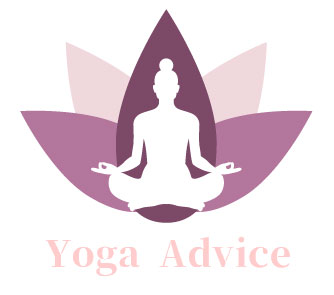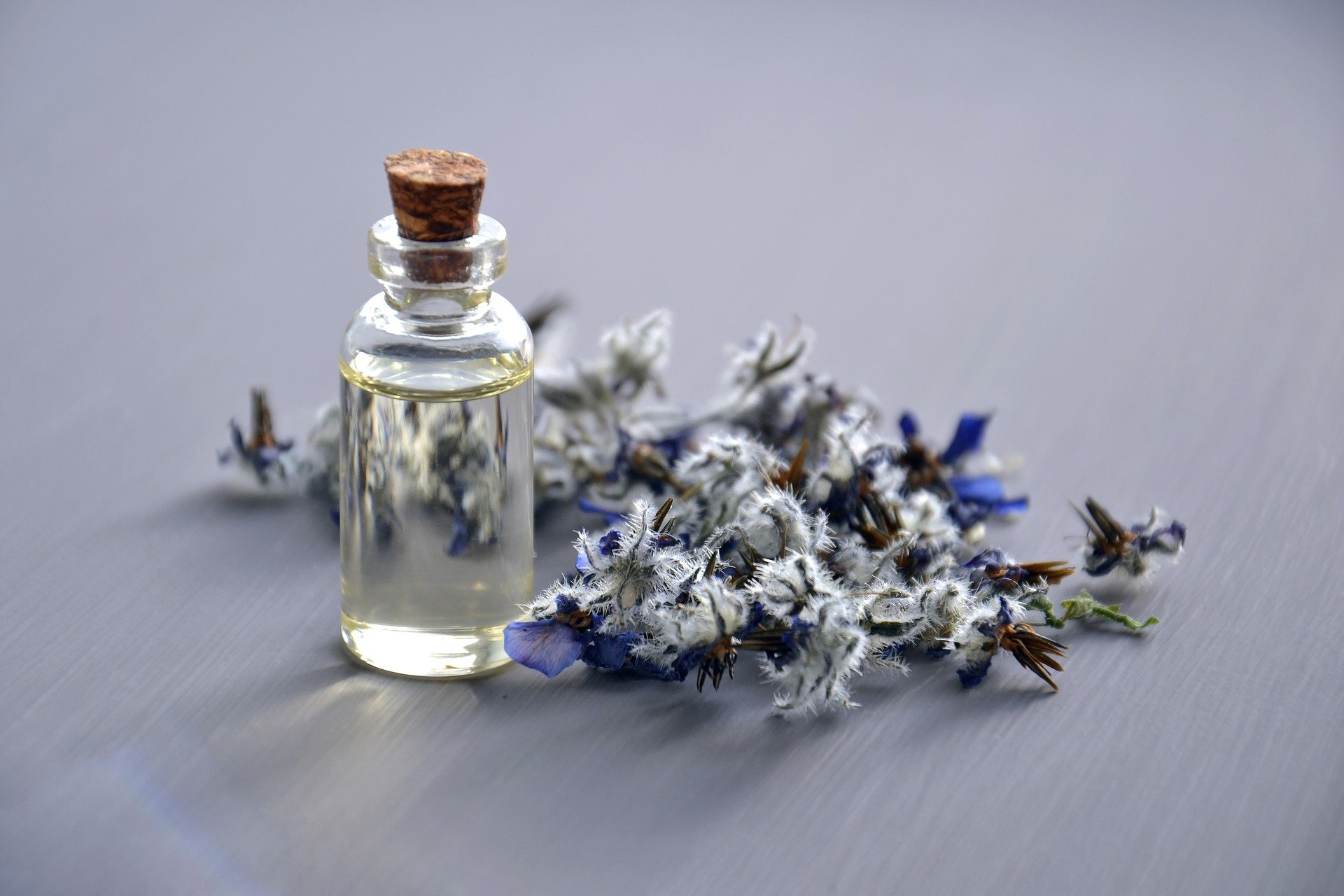All about essential oils
Essential oils are increasingly recognized for their benefits on well-being and health. Already in prehistory and antiquity, men practiced medicine by plants drawing from nature what to feed, heal themselves, embalm the dead.
The progress of the chemical industry has led man to abandon plants to treat himself with drugs. Very aware of the protection of our environment and the best way to preserve our health, we opt today more and more for natural products and care by plants.
We are witnessing a real craze for essential oils, especially since their effectiveness is proven in the areas of well-being, they help to live Zen, and health, for their curative properties. This way of treating oneself with essential oils is called aromatherapy.
But where do essential oils come from? How and why should they be used? And what are the precautions to take when using them for adults, pregnant women and children.
With this guide, we tell you everything about essential oils and their use, you can better understand the medical properties and benefits of aromatherapy.
WHAT ARE ESSENTIAL OILS
Initially, essential oils were used as raw material for perfumes or as active ingredients in medicines. Nowadays, they are used more widely in many occasions, for the house, the beauty, the kitchen in the field of the wellbeing or health...
An essential oil is a concentrate of active plant principles in liquid form (not containing fat, despite the name it bears), which has been extracted from the essences contained in a plant. Essential oil can be extracted from different parts of a plant: leaves, flowers, seeds, berries, bark, wood...
Essential oils can have a very different appearance, color or consistency. They contain active ingredients with various properties (antiviral, antiseptic, relaxing, anti-infectant, healing ...) very effective to treat the human being.
By steam distillation, by solvent extraction, by cold pressing (the part of the plant concerned is pressed and the essences recovered. In the case of cold pressing, we speak of essence and not essential oil).

How are essential oils used?
To fulfill their role, essential oils must be in contact with the body and are transported to the areas to be treated by the bloodstream. Most of the time, a few drops of essential oil are enough and are used : By steam distillation, by solvent extraction, by cold pressing (the part of the plant concerned is pressed and the essences recovered. In the case of cold pressing, we speak of essence and not essential oil).
• By cutaneous way : we apply directly some drops of essential oil, either pure or diluted in a vegetable oil (avocado, almond...), in massage, in compress or we pour some drops in the bath.
• By olfactory way : Inhalation allows to clear and heal the respiratory tracts and to act quickly on the nervous system. You can also use a diffuser to breathe in essential oils, sanitize and perfume the atmosphere of a room. You can use an essential oil alone or mix it with different essences. Asthmatics should be careful with the use of essential oils especially in case of crisis.
• By sublingual way or on the mucous membranes : by this way, the pain is relieved quickly because the essential oil penetrates more quickly into the blood.
• By vaginal or rectal way : in the form of ovules and suppositories.
As for the taking of a medicine, one will use an essential oil at an adapted time according to its virtues. A tonic essential oil will be used for example in the morning whereas a relaxing essential oil, in the evening...
Precautions to take when using an essential oil
- Buy only 100% natural essential oils.
- Choose an essential oil packaged in a glass bottle only, and in dark colored glass to protect the contents from light.
- Do not leave essential oil bottles accessible to children or animals.
- Store the bottles of essential oils in a dry place, away from heat and light.
- Consult and ask your doctor or pharmacist for advice for any treatment with essential oils and more particularly for children, pregnant women, people suffering from cancer or fragile and in case of sun exposure.
The ideal, before using an essential oil is to perform a tolerance test. To do this, dilute 1 or 2 drops of the essential oil you wish to use in a vegetable oil. Gently apply the solution obtained in the fold of the elbow or inside the wrist. Wash your hands thoroughly after application. Wait a few hours (at least 4 hours) and if you do not notice any local reaction (redness, irritation, burning, ...) during this time, you can use the essential oil without risk.
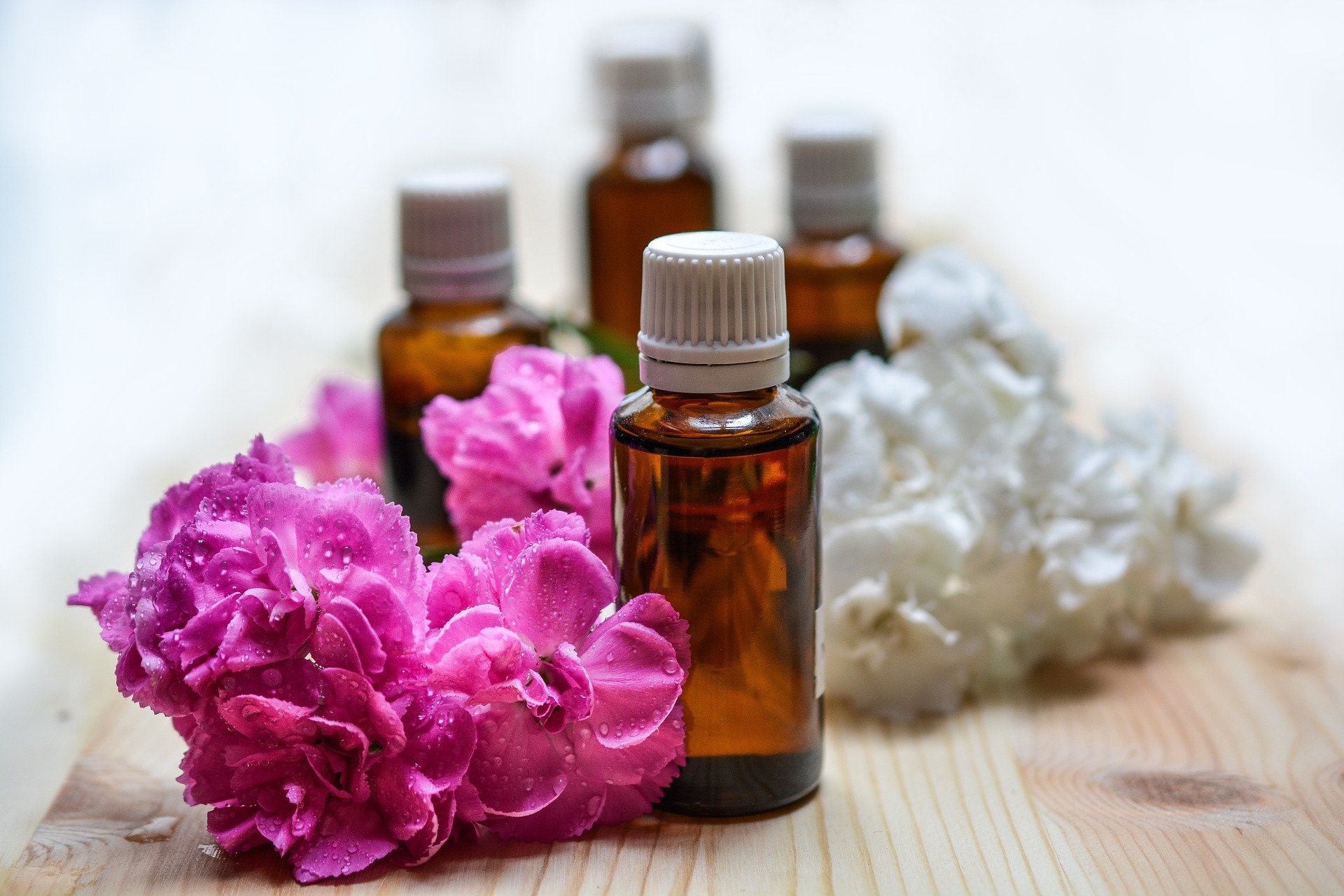
THE PRINCIPLE OF AROMATHERAPY
The name "aromatherapy" is formed from the Greek words "arôma" which means "perfume", "pleasant smell" and "therapeia" which means "care", "cure". Aromatherapy is therefore the art of healing with essential oils. Although plant medicine has existed for thousands of years, we have only been talking about aromatherapy since 1930.
Aromatherapy is a branch of phytotherapy. The difference is that aromatherapy uses an extract of a part of the plant, while phytotherapy uses the whole plant. One could almost say that the plants themselves invented aromatherapy, as they created essential oils to survive and protect themselves from diseases, sunlight, healing, attracting insects to promote pollination...
Essential oils are captured by our olfactory receptors and act on our nervous system and our behavior. They have many properties that are great alternatives to drugs.
The therapeutic properties of essential oils
The essential oils have indeed various therapeutic properties of which here are the most important:
• Anti-bacterial, anti-fungal, anti-viral, anti-parasitic
• Immuno-stimulant
• Circulatory
• Anti-inflammatory
• Analgesic
• Antispasmodic
• Calming and sedative
• Expectorant
• Stimulating
• Repellent

The dangers that essential oils can represent
But they can also be dangerous and in some cases cause in some subjects:
• Irritation
• Allergic reactions
• Inflammation of the kidneys
• Epilepsy
• Photosensitization
• Abortions...
In hot countries, spices are used a lot because the essential oils of the spices fight microbes and prevent the development of germs in food. It is important to respect the right dosage (count the drops well to avoid overdosing), the right dosage and the storage conditions.
How to diffuse essential oils ?
It is possible to create personalized aromatic compositions (mixtures of stimulating or soothing essential oils...) to disperse them in our environment. To do this, we use a spray bottle in which we pour a few drops of essential oils diluted in water and a little alcohol or a diffuser. Essential oils must not be burned because they could release carcinogenic substances, so avoid heated diffusers. Cold nebulizing or ultrasonic diffusers are preferred, as they do not heat and have a water reservoir to which drops of essential oils are added before use.
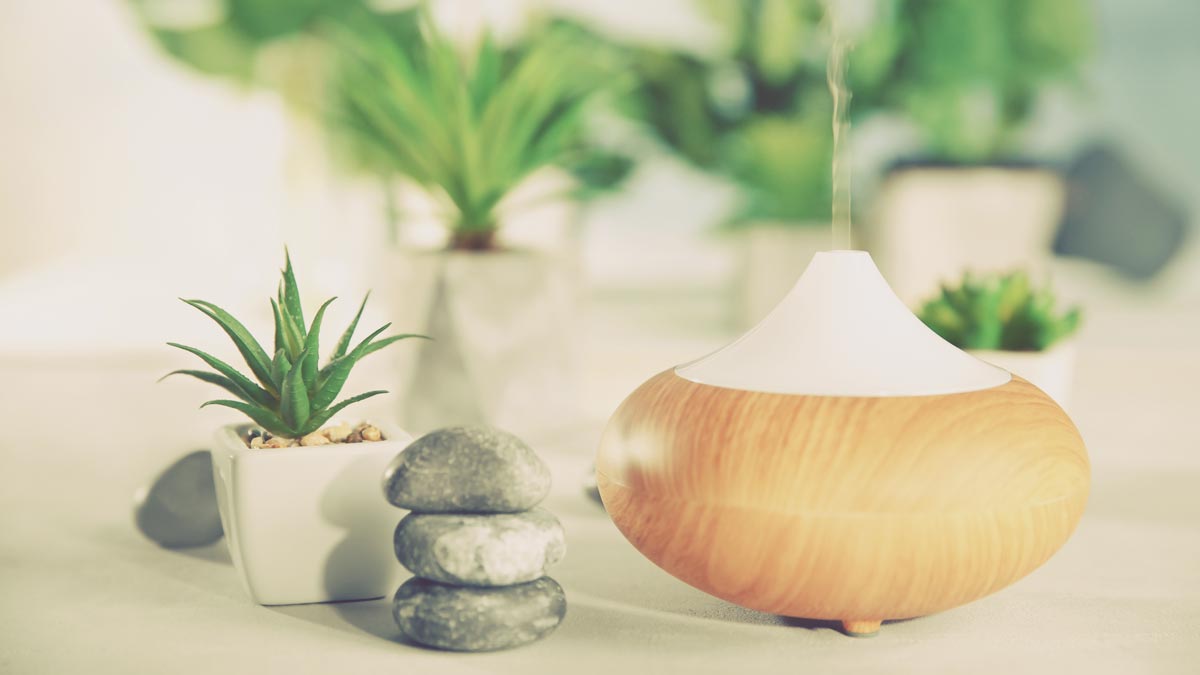
MENTAL & PSYCHIC WELL-BEING WITH ESSENTIAL OILS
In order to live in zen and preserve our mental and psychic well-being, we can call upon the action of essential oils because they influence our physical, emotional and mental states.
Our nose has 10 million nerve cells, which explains the impact that odors have on our well-being and our behavior. The sense of smell is in direct connection with the limbic brain which is the seat of emotional memory. The limbic system receives the information provided by the sense of smell without a filter and analyzes it without our awareness. It therefore manages emotions and acts on mood and behavior depending on whether or not it appreciates a smell. We better understand the power of essential oils and the olfactory information they send to the brain.
Some essential oils give off pleasant smells but they also have a deeper effect on our body. The soothing virtues of certain essential oils regulate our nervous system which has the effect of reducing our stress, calming us, helping us to take a step back or stimulating our concentration... The essential oils of peppermint and lemon, for example, diffused in our environment when a situation requires it, will promote our concentration and will allow us to redouble our vigilance.
Anxiety, stress, lack of self-confidence... which oil for which emotion?
Essential oils help us to control our emotions and overcome difficult situations. How to choose the right essential oil ?
• Essential oils to fight fatigue: Whether it is psychological, mental or physical, we can use the essential oil of Ylang Ylang in massage, mixed with a vegetable oil, or by olfactory way.
• Fear or emotional shock: The noble chamomile or Roman chamomile has a calming effect on the central nervous system and is very effective in mitigating the effects of emotional shock, fear ... Massage the solar plexus with 3 drops of essential oil of Roman chamomile, will help to cope with difficult situations more serenely.
• To look after the stress with essential oils: One will fight against the anxiety and the stress with a catch of 2 drops of essential oil of sweet orange in a spoon with honey. The respiratory tract is also appropriate. The essential oil of Bitter Orange is also recommended in this case: Place 1 drop on the inside of each wrist and inhale deeply, bringing your wrists close to your nose.
• A drop under the tongue of essential oil of Neroli helps to balance the nerves and restore energy. It will be effective when one remembers his problems, against overwork, during a nervous breakdown or to fight against a depressive state. It is enough to smell the opened bottle, to feel an immediate appeasement. The essential oil of bitter orange tree is also very effective to rebalance and calm.
• Aromatherapy against lack of self-confidence: In olfaction, the essential oils of bergamot, Neroli, laurel have a beneficial action when we lack self-confidence.
• Irritability, stay zen thanks to essential oils: Marjoram relieves psychosomatic disorders and fights against aggressiveness, irritability. It can be used in massage of the solar plexus or the sole of the feet or by placing 1 drop under the tongue.
• Grief, separations: When faced with situations that generate sadness, think of the comfort that Cypress of Provence essential oil can bring. When you feel the sadness rise, breathe a handkerchief on which you will have poured some drops of Cypress of Provence.
• To fight against the depression with essential oils: When you are depressed, think of the lemon Vervain. 1 drop under the tongue, 2 drops on a sugar cube or a few drops in an infusion will help you feel better and lower your anxiety.
The power of Essential Oils on our well-being in our environment
Using essential oils in our environment is beneficial for our health and well-being. They allow us to purify the atmosphere, to pleasantly perfume our interior and to create the best possible conditions around us. Here are some reflexes to have to take full advantage of their benefits:
The best soothing essential oils to diffuse are lavender, marjoram and orange essential oils, used alone or combined in a diffuser. But other antiseptic essential oils can also be used to pleasantly perfume the house and sanitize it, such as lemon, lemon eucalyptus, grapefruit, sweet orange, lavender, thyme, rosemary, cedar, cypress, pine, palmarosa, geranium, ylang ylang...
You can also place a few drops of an essential oil of your choice: lavender, eucalyptus radiata or lemon... on a cotton ball that you vacuum up with your vacuum cleaner. This will spread a pleasant smell everywhere you vacuum in the house and get rid of dust mites at the same time.
To deodorize the garbage can, simply pour a few drops of lavender and tea tree, eucalyptus radiata for example on a piece of cloth or cotton and place it in the bottom of the garbage can.
To keep insects away, essential oils are very effective. They can be used in diffusion, alone or in synergy with other essential oils.
• Biting insects (mosquitoes, wasps) are repelled by the essential oils of citronella, geranium, clove, lavender and lemon eucalyptus.
• Lemon and lavender essential oils help get rid of flies in the house.
• Essential oils of lemon, lemongrass, cloves or lavender drive away ants.
• Cedar, lemon, lavender or mint essential oils keep moths away.
• Lavender and Peppermint essential oils will scare away spiders.
• Tea Tree Essential Oil will drive fleas out of your home.
• To fight against dust mites, spray your bedding and your cushions and carpets with a mixture of Tea Tree, Clove and True Lavender essential oils.
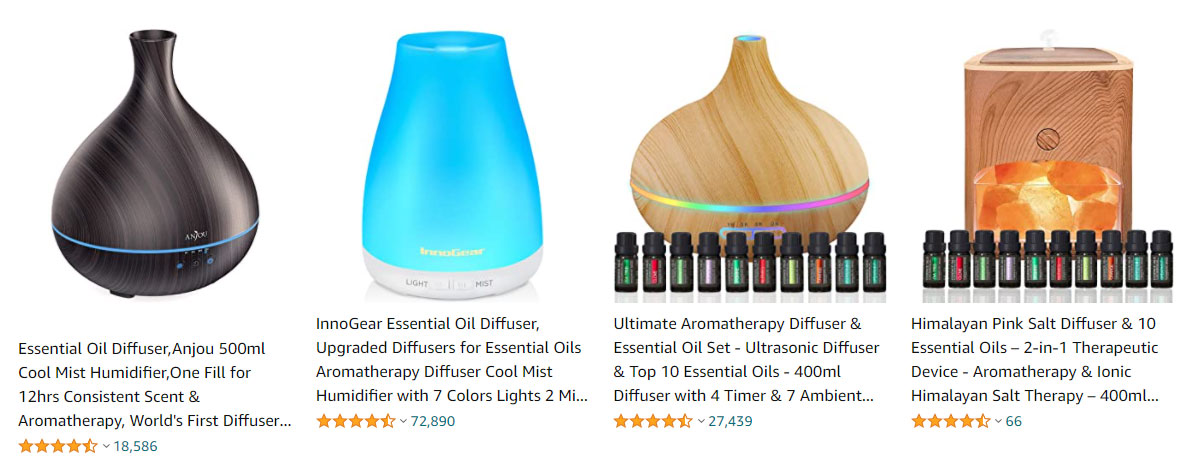
PHYSICAL WELL-BEING WITH ESSENTIAL OILS
The essential oil acts on our emotions, our emotional balance and our moods but it also helps to maintain our body balance, it contributes to the improvement of our quality of life, to the maintenance of the balance between our body and our spirit to maintain us in good health.
We can use essential oils to improve our physical well-being. For more efficiency we can also mix essential oils. There are guides giving you effective formulas but you can also ask your doctor or your pharmacist for advice, who will be able to elaborate preparations or suggest adequate combinations.
Here are some examples of essential oil remedies
After a muscular effort, if the effort was too sustained, if you were badly stretched, the lactic acid manufactured by your muscles is not evacuated and pains, sometimes intense, occur. A local massage (on the area of pain) with 2 drops of essential oil of wintergreen will relieve.
If you have bronchitis: Make you an inhalation: boil water and add 2 drops of essential oil of eucalyptus radiata, 2 drops of Niaouli and 2 drops of ravintsara and breathe the steam for at least 5 minutes.
In case of a sore throat, prepare a thyme and/or eucalyptus-based tea.
To treat a cold, inhale boiled water to which you have added a total of 6 drops of essential oils. You can choose among the essential oils of tea tree, eucalyptus, lavender, peppermint, niaouli, pine, rosemary cineole ... and use them separately or combined.
The essential oil of wintergreen is also effective to treat back pain (lumbago, sciatica). In this case gently massage the lower back with 3 drops of essential oil.
The torticollis are treated with 3 or 4 applications per day in light massage of 2 drops of essential oil of rosemary camphor.
In case of migraine or headaches, we will apply 2 drops of essential oil of peppermint on the temples and the forehead. We can also diffuse the essential oil of peppermint 2 to 3 times a day for an hour in the space where we are.
When a herpes appears, apply 2 drops of Niaouli essential oil every 2 hours on the affected area. Dilute them in a vegetable oil (calendula oil for example), if the pure application is too painful.
To soothe a dental pain, you can apply by massage on the painful area a solution composed of 15 drops of essential oil of clove and 5 drops of peppermint with some drops of vegetable oil.
A light massage of the solar plexus with a drop of essential oil of Marjoram at bedtime will help to fight against insomnia.
Good reasons to prefer essential oils to antibiotic drugs in case of illness
• Essential oils allow you to disinfect a room quickly (practical in winter when you don't air your house as long).
• An antibiotic drug destroys only a few bacteria whereas essential oils destroy many different germs. Unlike antibiotics, with essential oils, there is no microbial resistance.
• Essential oils stop the proliferation of harmful germs while having a positive influence on the immune response.
• Essential oils prevent microbes from reproducing and surviving and make the environment unsuitable for these germs to live in.
• Essential oils are not only antibiotic but also antiviral.
• Essential oils respect the intestinal flora.
The use of essential oils in cooking for better health
Tarragon seasoning: in ½ liter of olive oil add 40 drops of tarragon essential oil. This will pleasantly flavor your dishes and facilitate your digestion. You can also simply add a few drops of thyme or rosemary EO to a vinaigrette.
Essential oils can be used in dishes, such as making a coconut and lemongrass chicken. You add a little touch of exoticism: a few drops of lemongrass essential oil added to your chicken in coconut milk and served with rice!
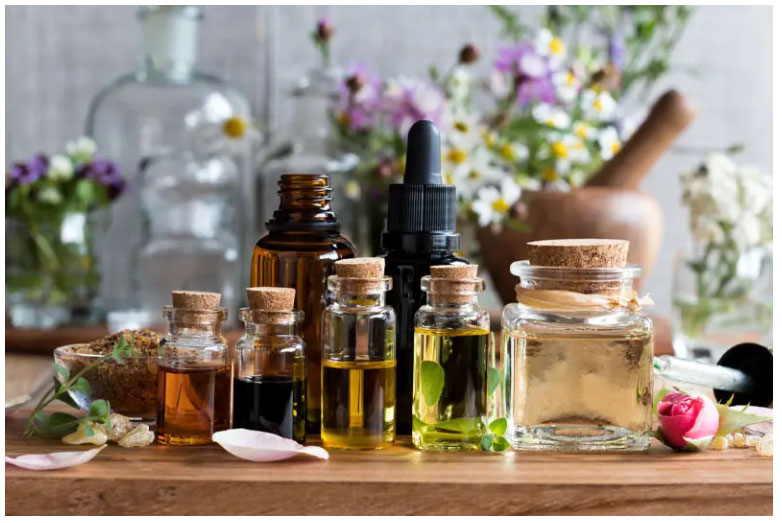
COSMETICS AND ESSENTIAL OILS
Essential EOs are used in cosmetics for hair, face and body beauty. They are present in anti-aging care and to solve certain skin problems. Here are some beauty recipes based on essential oils:
Mask to nourish and protect the skin (for all skin types): Mix 1 teaspoon of sweet almond oil (or Argan oil), 1 teaspoon of aloe vera gel, 1 teaspoon of almond powder and 3 drops of essential oil of rose geranium or bitter orange. Let the resulting paste sit for a few minutes and apply it to the face. Leave the mask on for 10 minutes and rinse thoroughly.
Soothing facial care: If your skin is sensitive, tight or red, apply a mixture of sweet almond oil (or Argan oil) with 2 drops of Roman chamomile or bitter orange essential oil.
Regenerating anti-aging care: Apply morning and evening on the face, 2 drops of essential oil of rosewood mixed with sweet almond oil (or Argan oil).
When you have an oily skin you can use lemon essential oil for its disinfectant power.
Eliminate couperose or stretch marks by applying 1 to 2 drops of essential oil of Italian helichrysum on the veins twice a day.
Various treatments of the rest of the body with essential oils
You can make your own mask with Ylang Ylang essential oil to bring shine, strength and vitality to your hair. We mix 2 egg yolks, 1 tablespoon of Grape Seed Oil and 4 drops of Ylang Ylang and apply it as a mask to the hair. Leave on for ¼ hour, 20 minutes and rinse thoroughly.
When you brush your teeth, add a few drops of Tea Tree essential oil to your toothpaste on the toothbrush because this essential oil has a disinfectant power and promotes teeth whitening.
Deodorants: You can use as a deodorant 1 drop of lavender or palmarosa essential oil under each armpit.
To fight against cellulite and its unsightly clusters, proceed to massages based on essential oil of Genevrier (5 ml) and vegetable oil of hazelnut (95 ml).
Moisturizing the body with essential oils
You can make yourself some body care:
• Rose oil: 100 ml of sweet almond oil, 1 tablespoon of rose petals, dried and still scented + 10 drops of essential oil of Damask Rose (can be replaced by the essential oil of Ylang Ylang).
• Moisturizing hand cream: 2 drops of Lemon essential oil mixed with a tablespoon of Shea butter.
• Strengthen your nails with a mixture of castor oil, glycerin and lemon essential oil. Apply the preparation on the nails by massaging them and leave them overnight. Proceed in this way for about fifteen days.
• After sun care: add 10 drops of carrot essential oil to 50 ml of olive oil. After sun exposure, apply this oil to the face and body to keep your colors.
It is also possible to create your own perfume with essential oils. Some essential oils can be applied directly to the skin, but it is often preferable to mix them with vegetable oils when they are to be applied to large areas or if you have sensitive or irritable skin. There are many vegetable oils such as avocado oil, sweet almond oil, Argan oil, borage oil, hemp oil...
The properties of hemp oil
One of the best oils for nourishing and moisturizing the skin is hemp oil.
Used as a mask with a few drops of essential oil of Ylang Ylang, it brings shine and volume to the hair and makes it silky. It strengthens the nails. It is a dry oil which penetrates quickly. It also combines perfectly with essential oils of Rosemary (healing) or thyme (for skin problems).
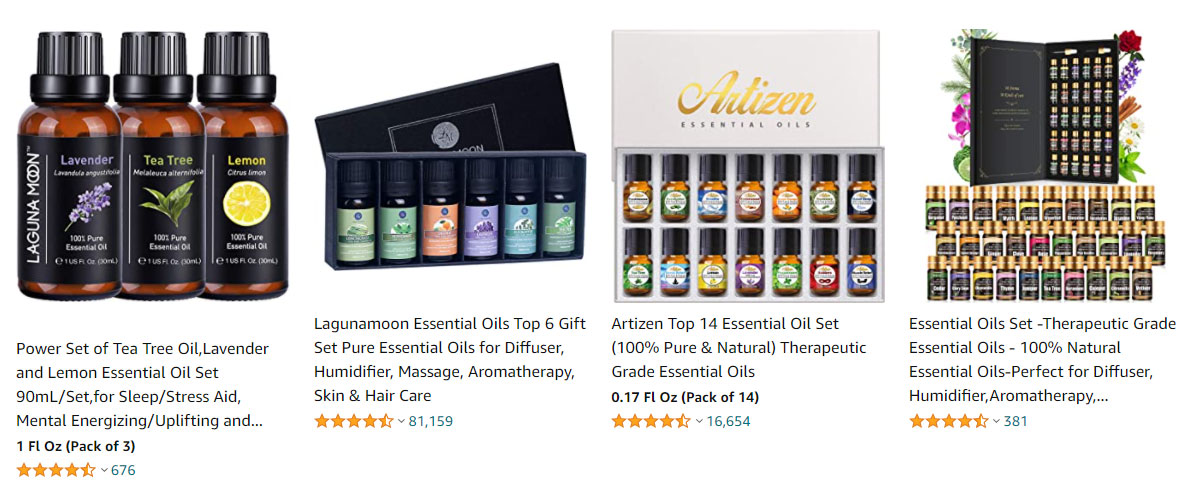
ESSENTIAL OILS DURING PREGNANCY AND FOR THE CHILD
Even if they treat effectively, essential oils must be used with caution by pregnant women and children in particular.
This is a precautionary principle, as it is for all medicines, but essential oils should not be used during the first 3 months of pregnancy because they could endanger the fetus.
Thereafter, essential oils containing no potentially harmful molecules can be used. As the majority of drugs are forbidden during pregnancy, the use of essential oils is a good alternative to treat oneself or improve one's daily well-being. Provided, of course, that you follow the dosage prescribed for pregnant women!
Do not take anything without the advice of your doctor or pharmacist. Treatments cannot exceed 10 days. It is imperative not to apply essential oil on the abdominal belt.
Some essential oils authorized during the 2nd and 3rd trimester of pregnancy:
• Tea tree (antiseptic, anti-inflammatory)
• Roman chamomile (to treat stress, anxiety)
• Lemon (for nausea)
• Tarragon (for nausea)
• Eucalyptus radiata (sinusitis, angina, otitis)
• Gaultheria (joint pain, stiff neck)
• Ginger (to treat constipation)
• Noble laurel (relieves pain, fights flu)
• Lavender (for insomnia)
• Lavender Aspic (insect bites, wounds)
• Pistachio mastic (to relieve breast congestion)
• Ravintsara (antiviral)
• Thyme (broad spectrum anti-infectant)
• Lemon verbena (for post-partum depression)
Essential oils for children
Aromatherapy can also be an alternative to classical medication for children from 3 years old. It avoids the systematic use of antibiotics. Some rare essential oils are contraindicated in children because they can cause nervous disorders.
In addition to the usual rules of caution when using essential oils, it will also be necessary to follow some particular precautions for the children:
Do not hesitate to ask your doctor or pharmacist for advice. Respect the advice of use, the dosages, the posology, Avoid imperatively any application of pure essential oil in the eyes, the nose or the ears.
Check that your child is not allergic to an essential oil or a mixture of essential oils by applying it to the fold of his or her elbow and make sure that no skin reaction appears within 24 hours.
Avoid any exposure to the sun during the 12 hours which follow the application of a photo sensitizing essential oil.
More specifically for children, essential oils or mixtures of essential oils should be used much more diluted than for adults. The diffusion of essential oils or the cutaneous way will be preferred rather than the oral administration Essential oils should be kept out of reach of children.
Here are some essential oils that can be used safely to relieve children from 3 years old:
• Chamomile Matricaria (anti-inflammatory, healing)
• Roman Chamomile (nervous system regulation, itching, allergies, anti-pain)
• Cistus (regulates immunity, balances the nervous system)
• Lemon (facilitates digestion, cleanses the liver, nervous system regulator)
• Lemongrass (mosquito repellent, calms mosquito bites)
• Cypress of Provence (anti-bullying, promotes circulation)
• Eucalyptus Citronné (anti-fungus, anti-mosquito, anti-inflammatory)
• Eucalyptus Radiata (viral epidemics and all winter diseases)
• Khella (asthma)
• True Lavender (anti-inflammatory, anti-pain, healing...)
• Myrtle (bronchitis, purifying)
• Sweet Orange (calming, disinfectant)
• Ravintsara (antiviral, angina, flu, nervous fatigue)
• Saro (antiviral, expectorant)
• Tea Tree (bacterial and viral infections, mycosis)
• Thyme Linalol (infections, angina, liver disorders)
• Ylang Ylang (analgesic, anti-fatigue)
Young mothers who are breastfeeding their babies should be especially careful if they take essential oils because their babies may ingest them through breast milk.

